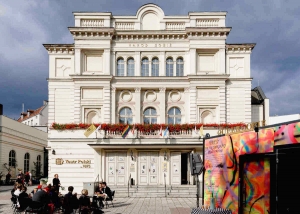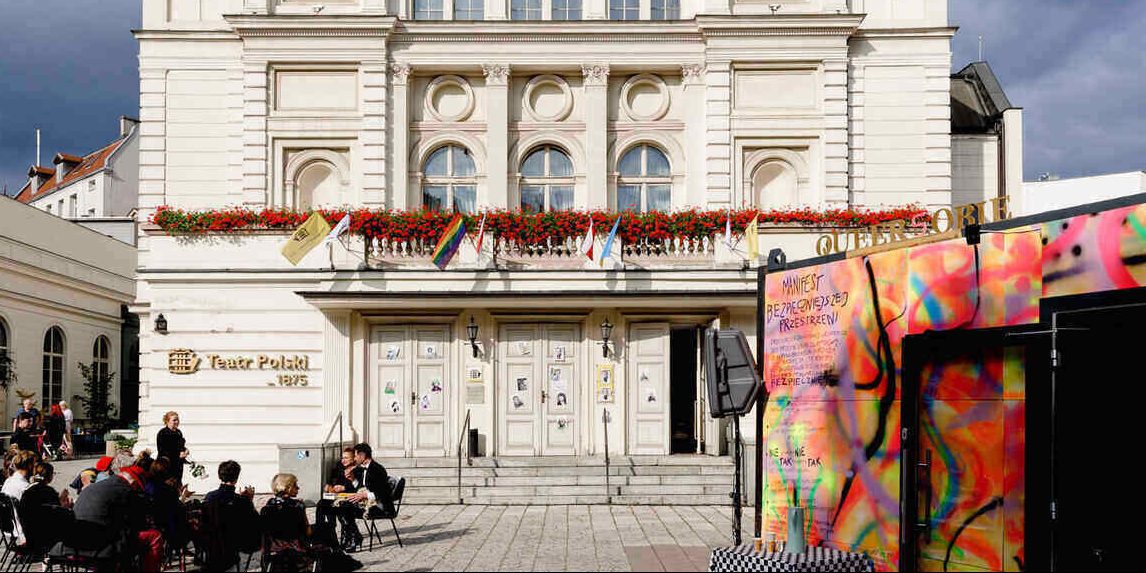Closer Strangers: East is a platform that enables ‘intercultural dialogue’. As a representation of the Polish, Ukrainian, Belarusian and Queer communities, this festival in not just a performance nor is it a commercial pursuit – instead, Close Strangers: East works to offer insight and respite for many communities, providing a safe platform of expression where there hasn’t been one previously. In comparison to the majority of Poland, Poznań has a reputation for being a tolerant city, and this festival is an absolute credit to that observation.
Over the weekend, I was fortunate enough to sit down with Agata Siwiak, the festival’s art director and curator. Agata is a strong believer in participatory art, believing it has a power that transcends traditional theatre to ‘forge bonds’. This style of theatre, in our contemporary climate, is seen as the solution to in-house performance; it is a modern alternative to the tradition we have been denied for the last 18 months. Agata, however, does not see this as a long-term solution. Theatre should be permanent, as well as immersive. This couldn’t be truer when you look around the cast and crew of the festival; the sense of comradery, of friendship and of safety is hugely palpable. I am told that this is a relatively unique atmosphere for theatre in Poland and that, despite what I am witnessing in Poznań, the theatre is predominately still a man’s world here, dictated by an oppressive hierarchy and often a violent and unpleasant place to be.
In fact, following a discussion with Roza Sarkisian, the director of H-Effect, it became incredibly clear how revolutionised the system was here at the Teatr Polski. Roza said to me that, although she is the director, she doesn’t believe in hierarchy. Hierarchy often stands in opposition to collaboration and both Roza and Agata believe that collective art is far more valuable. Agata describes how ‘there is no collective thinking in Poland’ and that this festival sprung up in the need to bring these conversations to the literal and urban stage.
To dive into the context of the festival a little further, each performer has lived experience of the injustices affecting lives in Europe today. Close Strangers: East is all about care, empathy and paying attention to your community and, importantly, the people outside it. When explaining a little more about Polish context, Agata made the stark comparison to Margaret Atwood’s Gilead regime from The Handmaid’s Tale, only not just targeted to women:
- That Walk – a participatory event on the streets of Poznań – discusses multiple stories of violence against women, making mention of the abortion laws. In Poland, there is very little punishment for perpetrators of violence against women and there is movement towards making types of contraception illegal.
- Stand-Up – a black comedy performance, which is littered with stories of the sexual violence, humiliation and sexism that often accompanies pageant work and activist movements.
- Queer Sobie – a safe space installation for the Queer community. Poland suffers from a lot of anti-gender propaganda and, as a largely Catholic country, the religion of the people means that homosexuality is often seen as an illness. Agata shares a sobering statistics that 70% of young LGBTQ+ Poles had considered suicide in their lives.

Of course, this paints Poland in a predominantly negative light and is not an accurate view of the full picture at all. However, for the communities represented in the festival, this is their reality and it’s a reality that, through their art, they are hoping to drive conversation and subsequently change around for upcoming generations. Importantly, Agata explains that the artistic agenda actually transcends the political agenda of the festival. Close Strangers: East is, first and foremost, about people coming together to create art. It is devoid of pressure and purposefully curated to inspire and encourage expression, at the hands of creative and industry experts.
Another thing discussed at length was the audience of the festival. I couldn’t help but notice that the crowd that was drawn in was rather small and mostly made up of the cast and crew. Agata was not phased at all by this, stating that everything has to start small and has to start somewhere:
After all, ‘Close Strangers: East is a quiet revolution’.
It only takes a few people popping in from the street to catch a glimpse of the Queer Sobie installation to begin rolling the dice of change. Agata has faith that this change is on its way but ultimately, and for now, this festival and its revolution of empathy will have to do.

